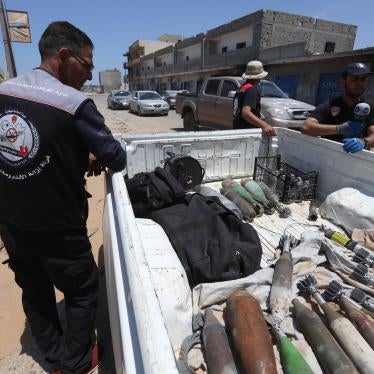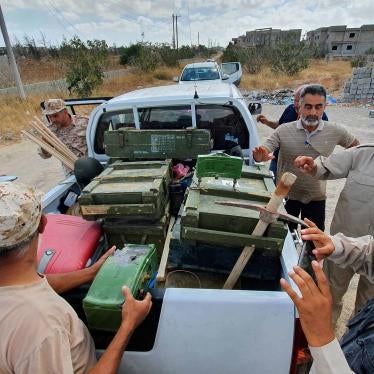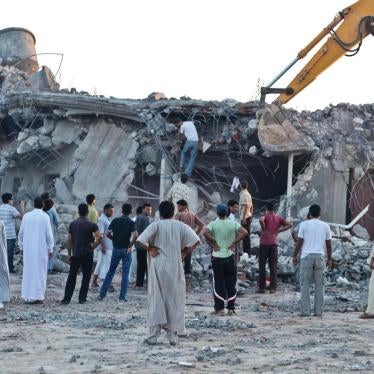H.E. Ibrahim O. Dabbashi
Permanent Representative of Libya to the United Nations
Dear Ambassador Dabbashi,
We wish to congratulate you on your election on 1 October as chair of the United Nations General Assembly (UNGA) First Committee on Disarmament and International Security. We wish you all the best for the coming month’s deliberations.
Human Rights Watch would like to draw your attention to two weapons of particular humanitarian concern that were not mentioned in Libya’s initial statement to the First Committee on 7 October 2013: antipersonnel landmines and cluster munitions.
As you will recall, armed forces of the Gaddafi government used antipersonnel landmines in various parts of Libya during the 2011 conflict. Uncleared mines continue to pose a threat to civilians today. Human Rights Watch reported on the use of at least five types of landmines during the conflict and we also urged that arms depots containing hundreds of thousands of landmines that government forces abandoned be urgently secured. On 28 April 2011, the National Transitional Council issued a communiqué pledging that “no forces under the command and control of the [NTC] will use antipersonnel or anti-vehicle landmines.” The communiqué also stated that “any future Libyan government should relinquish landmines and join the 1997 Mine Ban Treaty.”
Libya has not acceded to the Mine Ban Treaty, which has 161 states parties. Prior to 2011, the Gaddafi government participated as an observer in meetings of the Mine Ban Treaty but made no effort to join and often criticized the treaty’s complete ban on antipersonnel landmines.
Human Rights Watch also documented the use of cluster munitions in 2011 by Gaddafi forces in Misrata and other locations, causing civilian casualties. These weapons are also banned under international law. However Libya is not a party to the 2008 Convention on Cluster Munitions, which 113 nations have signed or ratified.
While efforts to clear and destroy Libya’s landmines and cluster munition remnants have progressed since 2011, the new Libyan government has not indicated a change of position on joining the Mine Ban Treaty and Convention on Cluster Munitions.
Since 1998, Libya has abstained from every annual resolution in support of the Mine Ban Treaty and on 3 December 2012 Libya again abstained from voting on UN General Assembly Resolution 67/32 supporting universalization and implementation of the Mine Ban Treaty.
Libyan representatives last month attended the Fourth Meeting of States Parties to the Convention on Cluster Munitions in Lusaka, Zambia, but made no statement to the meeting to explain Libya’s views on the convention or its activities to destroy cluster munitions.
The 2013 session of the UNGA First Committee is an appropriate moment for Libya to break with the past and to articulate a position that embraces the Mine Ban Treaty and Convention on Cluster Munitions. We urge the government to express its full support for these important humanitarian disarmament treaties and affirm Libya’s intent to accede in the near future. We hope that Libya will this year vote in support of the annual UNGA resolution on the Mine Ban Treaty, instead of abstaining.
Staff from the Arms division of Human Rights Watch will be attended the UNGA First Committee and would be more than happy to meet and discuss both the Mine Ban Treaty and Convention on Cluster Munitions.
Again, we wish you a successful UNGA First Committee on Disarmament and International Security.
Sincerely,
Philippe Bolopion
United Nations Director
Stephen Goose
Executive Director, Arms Division







